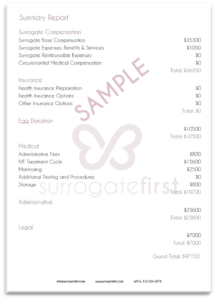A chance to breastfeed after surrogacy
Did you know that induced lactation for mothers of babies birthed by a surrogate is an option for those interested?
Though the process can be lengthy, taking several months to complete, it can be done with the help of a medical professional.
You also must be careful about keeping the lactation process moving forward for as long as the baby needs nutrition. Otherwise, you’ll stop making milk when the baby needs feeding most.
Still, even if that happens, you can start relactation exercises to get back on track.
Just because you didn’t naturally give birth to your surrogate baby doesn’t mean you can’t have this bond with your child. So, here’s what you need to know about inducing lactation if you’re an intended parent!
What is induced lactation, and why is it used?
Since preparing to breastfeed involves a complex interplay of hormones your body produces during pregnancy, induced lactation must recreate this process gradually. There is no easy way to begin producing milk without giving your body time to prepare itself, which is why a doctor will guide you through hormonal therapy months ahead of time.
The reasons you might want to induce lactation vary from case to case. Aside from being an intended mother who doesn’t have pregnancy hormones in her system, you may also be going through the process of adopting an infant, and be interested in breastfeeding.
Another common situation is when a mother can’t feed due to separation from her child, either because of an illness or a medical emergency. You might even need to re-lactate if your baby is intolerant to specific infant formulas and the child needs more natural nutrition.
Most of all, you want to breastfeed your baby because it allows you to bond like no other!
Intended mothers miss out on a lot of the emotional bonding that takes place during pregnancy. Going to doctor appointments, preparing a nursery, and breastfeeding, are three examples of behaviors that form this bond over time.
If you chose the surrogacy route due to infertility, breastfeeding can help you take part in your child’s most formative weeks. The only catch is that the process of inducing lactation is lengthy and requires strict adherence to hormonal therapy under a physician’s guidance.
What is the process for inducing lactation?
The process of inducing lactation starts months before your surrogate gives birth. Thus, it’s crucial to coordinate the timing of hormonal therapy with a surrogate agency.
The idea is to begin breastfeeding the child as soon as you take custody of the baby and keep breastfeeding for as long as it needs.
When one get pregnant, your body produces elevated levels of three hormones not long before you give birth:
- estrogen
- progesterone
- placental lactogen
After delivering the baby, these hormone levels decrease, triggering an increase in another hormone called prolactin.
Pregnancy itself results in the production of plenty of milk for the baby! Hormone therapy recreates this interplay in induced lactation to stimulate these hormoneseven though you didn’t experience lactation yourself.
How do I stop lactation when ready?
On the flip side, you might need to stop lactating if you feel uncomfortable or if the baby no longer needs it.
You may experience pain in your breast or chest when you start producing more milk than necessary, so to stop lactation, your medical provider will recommend that you cease frequent breastfeeding to slow down lactation.
Eventually, your body will stop making milk since you’re not actively feeding! However, in some instances, medication may be necessary to end lactation, especially if the breasts become painfully swollen despite doing everything right.
What are some reasons why I might not be able to lactate?
If you’re an intended mother, you won’t be able to start lactating without medications, but that’s not the only reason why women can’t produce milk.
As we mentioned above, there may also be an underlying medical complication limiting milk production, or you may be making too much for your body to hold.
The good news is that physicians know how to induce lactation, given the right commitment to do things right from the intended mother!
Otherwise, you may not have milk ready when your baby needs to feed once you bring them home.
Is it okay for intended parents to breastfeed their children?
So, the next question is: is it okay for intended parents to breastfeed their children?
The answer is a resounding yes!
Yes, you can absolutely breastfeed your baby born by surrogacy, even if you didn’t go through the lactation process naturally.
As a matter of fact, plenty of intended mothers prefer to breastfeed if they can!
Should the surrogate pump breastmilk for the baby?
If you can’t undergo hormone therapy to induce lactation, you can also arrange for the surrogate to pump breast milk for the child.
While it’s the easiest way to ensure your baby gets the proper nutrition from the gestational carrier, but it’s not the only avenue you can take! Usually, a surrogacy agency will coordinate everything from end to end, including breast milk pumping.
Pros of using the surrogate’s milk
The benefit of surrogate pumping breastmilk is that the baby will be feeding in the most natural way possible, and for many intended mothers, that’s what matters most.
You can also arrange a breastmilk pumping schedule well ahead of time so that everyone knows what to expect after the surrogate gives birth.
Lastly, a gestational surrogate may ship breast milk for the newborn if desired and coordinated via the surrogacy agency.
Cons of using the surrogate’s milk
Besides the cost element of the surrogate pumping, another downside is potentially missing an opportunity to bond with the child. Without a doubt, the emotional component is vital for the health of both mother and child, especially regarding mental health!
As you can see, just because you didn’t give birth naturally doesn’t mean you can’t breastfeed.
You can induced lactation to mimic the process and feed your surrogate baby on your own without a surrogate’s breastmilk.
About SurrogateFirst
SurrogateFirst is a boutique surrogate agency specializing in quickly matching intended parents around the world with our fully-vetted, exceptional surrogates.
We help individuals and couples, regardless of race or sexual orientation, build their families through the miracle of surrogacy.
Every team member at SurrogateFirst is either a former intended parent or an experienced surrogate herself. We also have first-hand knowledge of what it takes to have an incredible, successful surrogate journey.









